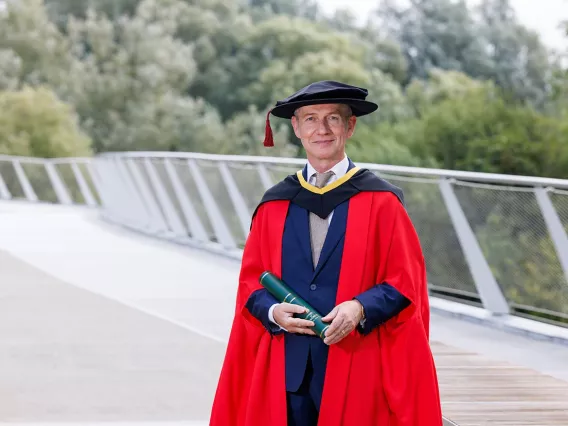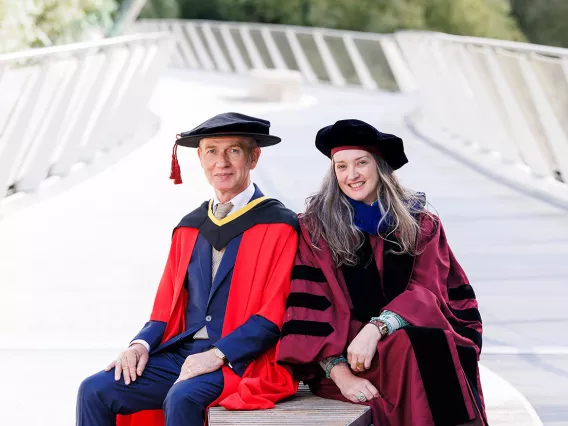
Critically acclaimed Irish songwriter and performer Iarla Ó Lionáird was conferred with a PhD in Arts Practice from University of Limerick this week.
The twice Grammy nominated artist said his late father knowing he completed his PhD was one of his proudest moments.
“When I handed in my doctoral study in January, my dad rang me. He actually passed away that same month, but he rang and said ‘A Dhoctúir’ (Doctor). I said, ‘you're jumping the gun’, ‘no’, he said, ‘the work is done’.
“I feel proud that he knew that I was finished and that he luxuriated in that because he was an educator himself. He was a principal of a secondary school, a very successful principal and beloved by his community.
“So that was one of the greatest feelings I have to say, that Dad knew I'd finished it, but also that I had finished it myself.”
Iarla’s educational journey in UL began back in 2003 when he completed a Masters in Ethnomusicology during a break from touring with his former band Afro-Celt Sound System.
“My relationship with UL started on a personal level through Mícheál Ó Súilleabháin, the founder of UL’s Irish World Academy of Music and Dance, because we had been performing concerts together, him on piano and me singing, something we continued to do right up until his death.
“So that brought me in, his vision that people of my background and from within the oral musical tradition could have access to the Academy, could be given parity of esteem - intellectually, aesthetically, artistically, and could be acknowledged as artists and masters in their own right.
“Compared to other educational entities, I think the Irish World Academy has a definitive philosophical stance rooted in a broader equality. And I found that very attractive, I must say.
“During that time when I was doing the masters, it was a very steep learning curve and there were times I might have been despairing about my capability and I would go into Mícheál’s office and no matter how doleful I might have been going in, I always left his office feeling a foot taller. He really made me feel like I could do it and empowered me, and really it supercharged my efforts in that period.”
Dr Ó Lionáird has carved a long and unique career in music both internationally and in Ireland but credits his introduction to new classical music as one of the most pivotal moments for him, through working on Grá Agus Bás with Dublin composer Donnacha Dennehy.
“That was a real game changer for me that led to me doing work in opera and many, many other projects in the new classical field, which I always find very interesting.
“I'm not classically trained, though do a lot of work in that realm, but it has been a huge challenge for me. I probably wouldn't have been quite so emboldened to do any of it had it not been for my encounter with UL and the room it gave me to be curious about my own practice.”
The newly minted Dr Ó Lionáird joined more than 3,600 students being conferred this week as part of the University’s Autumn Conferring Ceremonies.
“I didn't have a particularly happy undergraduate experience in Carysfort College but my postgraduate study in UL really re-enamored me, it made me fall in love with the process again, it made me feel that I could be part of it, and it was a very, very big educational step for my mind.
“I used to drive home every day with my head on fire, whatever work I did as an undergraduate in college didn't seem to fire me up at all compared to what happened to me at UL when I was doing my masters.
“I was very fortunate with my supervisor Dr Aileen Dillane, who is probably one of the most gifted intellectuals I've ever met, and a wonderful teacher, so that helped enormously.”

Preferring not to be categorised, Iarla’s musical interests range from traditional sean nós song to worldbeat, from alt folk to opera.
His thesis, entitled Aphelion, examines the relationship Iarla has with his practice and is a study on connection and distance, on the mutability and persistence of memory and on the skill sets and pre- occupations that maintain both the connection to an original practice and also motivate a powerful yearning for the exploratory.
“Aphelion, a Greek word, describes a planetary body at its furthest remove from its home star, but still within its gravitational embrace.
“As a child of the space age I've always been very interested in space and spatial geographies and so that metaphorical framing suited me very well. Because in the gravitational set up, the notion might be that one is speeding away from the sun or the planet, and in the past I might have felt that this was apt as a metaphor for me and my musical journey.
“But in fact in an orbital trajectory - which I have found best describes my practice’s relationship with the culture of my upbringing - one is merely perpetually falling forward, balanced between the pull of home and the velocity and momentum of forward motion.
“And so my study examines a practice that is in essence a practice that is always in motion – propelled by a hunger for the novel, for change, for growth and yet and perhaps somewhat paradoxically, it is a practice that remains emotionally, spiritually and culturally tethered to home and the more received and engendered practice of my youth - its particular acoustemology, language, culture and deeply imprinted beliefs and practices.”
Co-founder and vocalist with the acclaimed international band The Gloaming, Dr Ó Lionáird admits juggling his PhD with a thriving career was “a huge challenge”.
“It definitely didn't help that I was busy. Just when I started my PhD, I became incredibly busy with The Gloaming in particular, which necessitated an enormous amount of travel. I didn't find it easy to coordinate all of it.
“And I think one of the challenges with this type of doctoral study is the necessity for so much self-examination. It involves the evolution of ideas that really can't be hurried, because you don't necessarily find them in a book, you must find them in yourself.
“At the end, you have to decide to finish it. No amount of telling you is going to do it, though I had tremendous encouragement from Professor Helen Phelan and Dr Aileen Dillane in particular- tremendous and unceasing encouragement.”
Originally from West Cork, Iarla’s unique singing style has carried him to stages all over the world, from New York's Carnegie Hall to the Sydney Opera House, London’s Royal Albert Hall and beyond.
Reflecting on if his research influenced his craft, he said: “I'm fairly confident that it didn't change my practice in any fundamental sense, but crucially, it did allow me to understand it better and to accept it and to embrace it and to be okay with the irregularities, the contradictions, the tensions and the freedoms that it throws up. That has real and lasting value I feel.
“Going into the viva, (an oral examination that sees a PhD student defend their thesis and showcase their knowledge to a panel of academic experts) was a very nice feeling. I won’t forget the generosity of the external examiner and the chairman; they were very kind. So really, it's been a great adventure.”